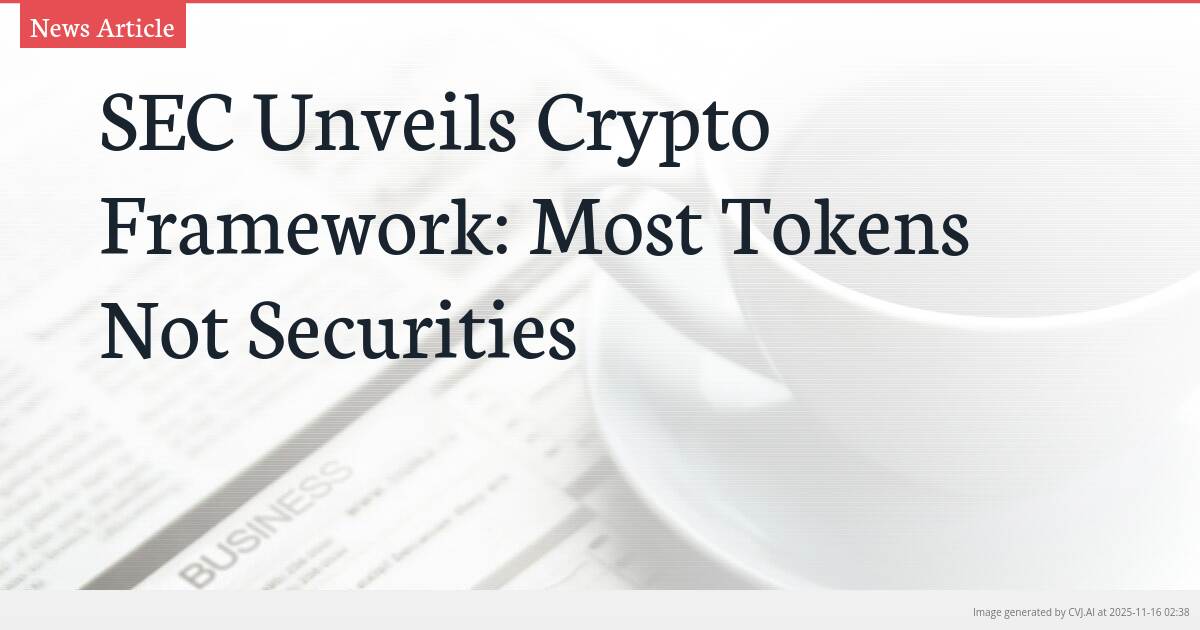This summary text is fully AI-generated and may therefore contain errors or be incomplete.
Introduction
The U.S. Securities and Exchange Commission has unveiled a transformative regulatory framework that fundamentally reshapes how digital assets are classified under federal securities laws. In a pivotal announcement, SEC Chairman Paul Atkins revealed that most cryptocurrencies currently trading do not qualify as securities, marking a significant departure from previous regulatory uncertainty and providing long-sought clarity for the digital asset industry.
Key Points
- Most cryptocurrencies trading today are not considered securities under the new SEC framework
- Digital commodities, NFTs, and utility tokens are explicitly excluded from securities classification
- Tokens can transition out of securities status once issuer managerial promises are fulfilled or terminated
Redefining Crypto Classification
The SEC’s new framework, developed under “Project Crypto” and guided by Chairman Paul Atkins and Commissioner Hester Peirce, introduces a functional taxonomy that categorizes digital assets based on their purpose and the expectations of purchasers. This approach represents a fundamental shift from the decade of uncertainty that has characterized cryptocurrency regulation, where the evolving nature of digital assets created persistent classification challenges. The framework explicitly excludes digital commodities, network tokens, and digital collectibles like NFTs from securities classification, recognizing that buyers of these assets do not anticipate profits derived from the managerial efforts of others.
Chairman Atkins emphasized the dynamic nature of crypto classification, stating that a cryptocurrency being part of an investment contract under the Howey test does not permanently designate it as a security. “I believe that most crypto tokens trading today are not themselves securities,” Atkins declared, highlighting that once issuers fulfill, fail to satisfy, or terminate their managerial promises, tokens may continue trading without securities classification. This nuanced understanding acknowledges that digital assets can transition between regulatory categories based on their development stage and functional characteristics.
The Howey Test in Digital Context
The SEC’s application of the Howey test—which identifies investment contracts as involving money investment in a common enterprise with profit expectations from others’ efforts—has been refined for the digital age. The framework recognizes that the temporary inclusion of tokens in investment contracts doesn’t confer permanent securities status. This interpretation provides crucial flexibility for crypto projects that may begin with centralized development but evolve toward decentralized networks where managerial efforts become less significant.
Digital tools serving practical purposes such as memberships, tickets, credentials, or identity verification are explicitly excluded from SEC oversight under the new taxonomy. Similarly, tokenized securities continue to be regulated as traditional securities, maintaining consistency with existing regulatory frameworks. The initiative also includes plans for exemptions and special offerings for digital assets tied to investment contracts, creating pathways for compliant innovation while preserving investor protections.
Coordinated Regulatory Approach
Project Crypto, first launched in July 2025 and headed by Atkins and Peirce, represents a comprehensive effort to differentiate between securities and other digital assets while providing clarity, fairness, and integrity for developers, investors, and intermediaries. The SEC will coordinate with Congress, the Commodity Futures Trading Commission (CFTC), banking regulators, and other stakeholders to create a cohesive regulatory environment that supports innovation while maintaining robust investor protections.
This regulatory clarity arrives during a pivotal week for digital asset regulation. On November 10, the Senate Agriculture Committee shared a draft plan to regulate digital asset commodities, while the U.S. Treasury and IRS issued guidance allowing staking on crypto ETPs and passing staking rewards to retail investors. These coordinated developments signal a maturing regulatory landscape that acknowledges the unique characteristics of digital assets while addressing potential risks.
Despite the reclassification of many tokens, fraud remains subject to enforcement, and anti-fraud provisions will continue to apply even to tokens no longer classified as securities. This balanced approach ensures that investor protections remain intact while allowing legitimate projects to flourish under appropriate regulatory frameworks. The SEC’s initiative represents a significant step toward establishing the United States as a leader in responsible digital asset innovation.
📎 Read the original article on cryptopotato.com

